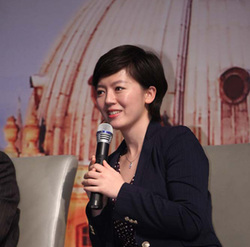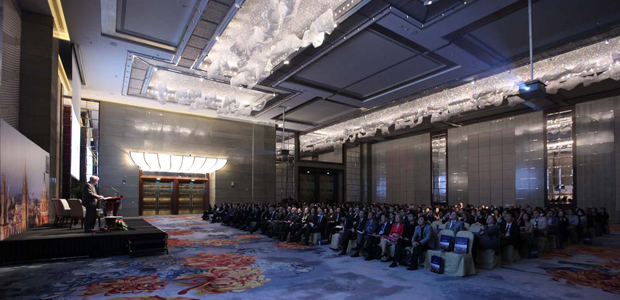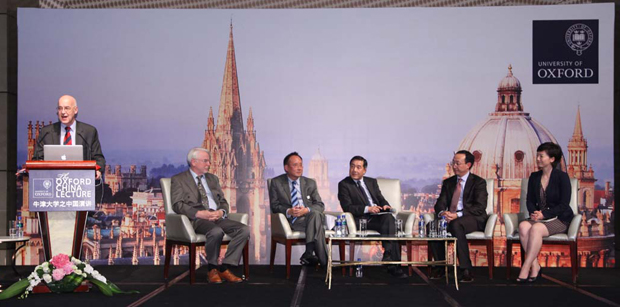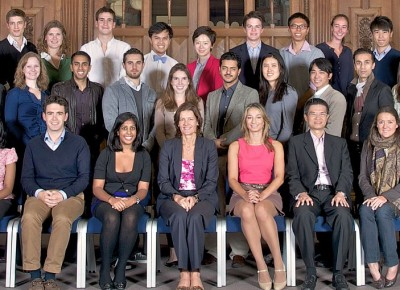Encounters with Alumni from Greater China

Liu Haining (St Hugh's 2012) is an
experienced journalist and news anchor from China. Liu has interviewed
high-profile policy makers and reported on China's major news stories including
the Shanghai World Expo, Beijing Olympics and the aftermath of the Sichuan
Earthquake. Her career in journalism started at the Shanghai Bureau of South
China Morning Post, and she moved into broadcast media in 2007 with Beijing
Television, anchoring the network's Nightly News at 10pm. Her most recent media
position was with CCTV News, China's only 24-hour English news channel, as News
Correspondent and anchorwoman. In 2012, Liu joined the inaugural
cohort of the Masters of Public Policy programme at the Blavatnik School of
Government, University of Oxford. She also holds a Master degree in
Communication studies from the Journalism School of Fudan University.
For a few days in the last month of 2013, Shanghai was suffering from the severest smog in the city’s history. It was also my final days presenting the BBC radio documentary “Missing Histories: China and Japan”. We made the final recording on the Bund of Shanghai, next to the port from where ships travel between China and Japan every week. It was a splendid scene at the waterfront of Huangpu River. But I had a difficult time convincing my Japanese and British colleagues to love the city as much as I do, because of the heavy smog.
I gradually lost my patience too. The air pollution was just overwhelming. Having spent a year in Oxford study public policy, I realised the significance of issues underneath the smog, things that are beyond our eyes can see. Changes must be made, in terms of environment, energy and urbanisation policies of China.
For a few days in the last month of 2013, Shanghai was suffering from the severest smog in the city’s history. It was also my final days presenting the BBC radio documentary “Missing Histories: China and Japan”. We made the final recording on the Bund of Shanghai, next to the port from where ships travel between China and Japan every week. It was a splendid scene at the waterfront of Huangpu River. But I had a difficult time convincing my Japanese and British colleagues to love the city as much as I do, because of the heavy smog.
I gradually lost my patience too. The air pollution was just overwhelming. Having spent a year in Oxford study public policy, I realised the significance of issues underneath the smog, things that are beyond our eyes can see. Changes must be made, in terms of environment, energy and urbanisation policies of China.
The Oxford delegation arrived at the most critical time. On 10th of December, Tuesday, when the inaugural Oxford China Lecture was held in Shanghai, the smog was completely gone. It might be a happy coincidence, but should rather be a good sign. “Fortis est veritas” (“The truth is strong”). For nearly a thousand years, it has been the university’s mission to lift the fog over knowledge. This time, it literally ‘lifted’ the smog over Shanghai by bringing together Oxford alumni, government representatives, business and academic leaders from Shanghai and elsewhere in China talk about the future of cities under the joint impact of climate change, new technologies and the trend of urbanisation.
I was lucky to be part of the very first Oxford China Lecture. As the chairperson of keynote panel discussion, I had the most dynamic conversation with my panellists, following the lecture given by Professor Steve Rayner from Oxford. Whether and how would cities make our lives better? What can we do to design buildings that fit the needs of tomorrow? What about transportation systems? Should we stick with cars or should we switch back to bicycle? Given the complexity of the issue, the list of questions went on and on. Regarding the last question, I was so happy to see that nearly half of the audience raised their hands when I asked how many of them took the public transportation for this lecture. The interaction with the audience, about 400 strong, was the best one I’ve ever had. It demonstrates the strength of Oxford community in China.
The lecture also reminded me of the three-story building at 10 Merton Street, Oxford, right next to the Logic Lane off the buzzing High Street. Once the Philosophy department, the building now houses Oxford’s youngest member: Blavatnik School of Government. It has been my intellectual home for the past 12 months, my memory of the dreaming spires, and my formal education in public policy. In September 2012, I became one of BSG’s first cohort of students in MPP (Master of Public Policy) programme. 38 of us, coming from 19 countries and regions around the world, spent almost every day together, learning, debating, and laughing. We were called the “adventurers”, for it is not usually considered a risk-averse decision to join the very first year of a new academic programme in a new school. But that’s exactly who we are, the “adventurers”, and it has turned out to be the best time of my life.
I remembered the first day we met each other in BSG. We talked about our career goals, the ultimate dreams in public service. Many of my classmates said they would become ministers, prime ministers or even presidents of their own countries. I could not believe my ears back then. My dream, I said, would be to interview each one of you when you finally become the global shapers. One year later, I am now firmly convinced my fellow MPPs will make it happen. Some are already on the right track. That is how we have been changed, how the one year at Oxford has turned our lives around. We dare to dream, and we work hard for it.
The lecture also reminded me of the three-story building at 10 Merton Street, Oxford, right next to the Logic Lane off the buzzing High Street. Once the Philosophy department, the building now houses Oxford’s youngest member: Blavatnik School of Government. It has been my intellectual home for the past 12 months, my memory of the dreaming spires, and my formal education in public policy. In September 2012, I became one of BSG’s first cohort of students in MPP (Master of Public Policy) programme. 38 of us, coming from 19 countries and regions around the world, spent almost every day together, learning, debating, and laughing. We were called the “adventurers”, for it is not usually considered a risk-averse decision to join the very first year of a new academic programme in a new school. But that’s exactly who we are, the “adventurers”, and it has turned out to be the best time of my life.
I remembered the first day we met each other in BSG. We talked about our career goals, the ultimate dreams in public service. Many of my classmates said they would become ministers, prime ministers or even presidents of their own countries. I could not believe my ears back then. My dream, I said, would be to interview each one of you when you finally become the global shapers. One year later, I am now firmly convinced my fellow MPPs will make it happen. Some are already on the right track. That is how we have been changed, how the one year at Oxford has turned our lives around. We dare to dream, and we work hard for it.
It remains dream to interview my friends when they start to run the world. My five-year broadcasting experience in China could be a good foundation, but it still made a big difference when I joined the BBC in London, as a radio current affairs researcher in this summer. It was far from being perfect, of course, but as my producer once said to me on my first day: “The toughest part is to get it, and you have made it”.
Truly I have made it. Three months later, I became the co-presenter of a BBC radio documentary – “Missing Histories: China and Japan”. It is a key project of the BBC’s 2014 ‘Freedom’ season, focusing on the history, current relations, education policy and public perceptions in these two neighbouring countries. Whilst the tension on East China Sea was escalating for the disputed islands, our team travelled from London, to Japan, then China, interviewing historians, politicians, war survivors, school children and their parents, in Tokyo, Yokohama, Beijing, Nanjing and Shanghai, in merely two weeks. We have had different views, arguments, memories, and sometime, tears. There were also struggles and frustration during the trip, for no one else in the BBC, or any other media outlet in the world, has done anything similar.
I strongly recommend my fellow Oxonians to follow this programme and cannot wait to hear about your opinions. This is my graduation gift to Oxford, my way of living the dream while thousands of miles away from the dreaming spires, my way of showing the “strengths of truth”.
Please stay tuned - Missing Histories: China and Japan, presented by Haining Liu and Mariko Oi, produced by Neal Razzell, on BBC World Service, coming up in early February, 2014.
Written in December 2013
Truly I have made it. Three months later, I became the co-presenter of a BBC radio documentary – “Missing Histories: China and Japan”. It is a key project of the BBC’s 2014 ‘Freedom’ season, focusing on the history, current relations, education policy and public perceptions in these two neighbouring countries. Whilst the tension on East China Sea was escalating for the disputed islands, our team travelled from London, to Japan, then China, interviewing historians, politicians, war survivors, school children and their parents, in Tokyo, Yokohama, Beijing, Nanjing and Shanghai, in merely two weeks. We have had different views, arguments, memories, and sometime, tears. There were also struggles and frustration during the trip, for no one else in the BBC, or any other media outlet in the world, has done anything similar.
I strongly recommend my fellow Oxonians to follow this programme and cannot wait to hear about your opinions. This is my graduation gift to Oxford, my way of living the dream while thousands of miles away from the dreaming spires, my way of showing the “strengths of truth”.
Please stay tuned - Missing Histories: China and Japan, presented by Haining Liu and Mariko Oi, produced by Neal Razzell, on BBC World Service, coming up in early February, 2014.
Written in December 2013



